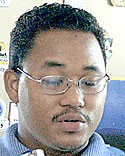PHOENIX – The Arizona Students’ Association filed a civil suit yesterday against its former executive director, Maceo Brown, accusing Brown of stealing more than $200,000 over a four-year period from the nonprofit student advocacy organization.
Brown had been diverting funds from the organization’s bank account for four years and then produced doctored financial statements in defense when ASA requested documentation in January, said Jess Koldoff, a spokesman for ASA. Brown resigned from his position with ASA Jan. 29.
Several messages left on Brown’s answering machine by the Arizona Daily Wildcat were not returned at press time.
According to court documents, ASA staff members at the central
office in Phoenix became suspicious of Brown’s financial transactions in early January, when a staff member trying to get ASA insurance reinstated came across an ASA bank statement from December 2005 listing more than $500 in ATM withdrawals.
Koldoff, the president of the Graduate and Professional Student Association at Arizona State University and an ASA board member, said the need for cash withdrawals are exceedingly rare because Brown had an ATM card and a checkbook at his disposal.
The court filing lists other unusual charges on the December 2005 bank statement including charges for restaurants and unknown medical charges, including a visit to a dermatologist.
ASA office staff confronted Brown on Jan. 20, saying some of the suspicious charges had been deducted from his payroll check while other charges were being disputed as fraudulent, according to the document.
Further review by ASA led to the discovery of new suspicious transactions, leading Brown to e-mail six months of bank records to the board of directors for ASA on Jan. 25.
Ryan Murphy, an attorney hired by ASA, said the bank records were compared to the records provided by the bank and were found to be fraudulent.
Murphy suggested Brown used image-editing software, like Adobe Photoshop, to manipulate the records.
He said Brown intentionally altered documents to make them seem legitimate, giving the example of a $71.24 charge to the Olive Garden that was altered to appear like the charge was from Kinko’s rather than the restaurant.
“”There were numerous times where transactions were just deleted,”” Murphy said.
Since Brown’s resignation, ASA has hired a forensic accountant to investigate his transactions over his tenure as executive director.
ASA estimates Brown stole $209,056.31 from the organization since he was hired in May 2001.
“”He went to great lengths to cover up these purchases,”” said Erin Hertzog, an ASA board member. “”He doctored bank statements, altered budgets and financial records.””
ASA officials voted yesterday to change portions of its bylaws to protect against future attempts to misappropriate ASA funds.
“”We are doing everything we can to get the money back, including civil litigation and revamping our (ASA) policies for next year to ensure that nothing like this could ever happen again,”” Hertzog said.
The board voted to require itself to perform monthly reviews of ASA bank statements and internal audits twice a year and to require formal financial management and fraud-detection training at its annual board training sessions.
“”Despite this unfortunate situation, the Arizona Students’ Association remains committed to advocating on behalf of access and affordability to higher education,”” Koldoff said. “”We take our responsibility on behalf of the students of Arizona very seriously, and these steps will help us prevent and detect fraud from going forward.””
The ASA budget comes from a $1-per-semester fee from each student at public universities in Arizona.
Serena Unrein, the acting executive director for ASA, estimated the current ASA budget to be approximately $250,000.
While ASA labeled Brown’s actions as an “”unfortunate situation,”” it stands by its record of lobbying for Arizona students.
“”ASA has lobbied aggressively for the past four years for students, and I don’t think the stolen money has affected anything as far as our lobbying efforts go,”” said Hertzog, the UA acting student body president.
Hertzog said despite Brown funneling money out of ASA, she could not remember any lobbying effort being cancelled due to insufficient funds.
“”We went on all the same trips and did as much lobbying as we did in the past,”” Hertzog said.
Ben Graff, the voting student regent and former UA student body president, lost to Brown in 2001 for the ASA executive director position. He said being the other final candidate for the position put him in an awkward position and he has kept his distance from the organization.
Graff said the changes made by ASA directors yesterday as well as proposed changes made him confident the situation will not happen again.









